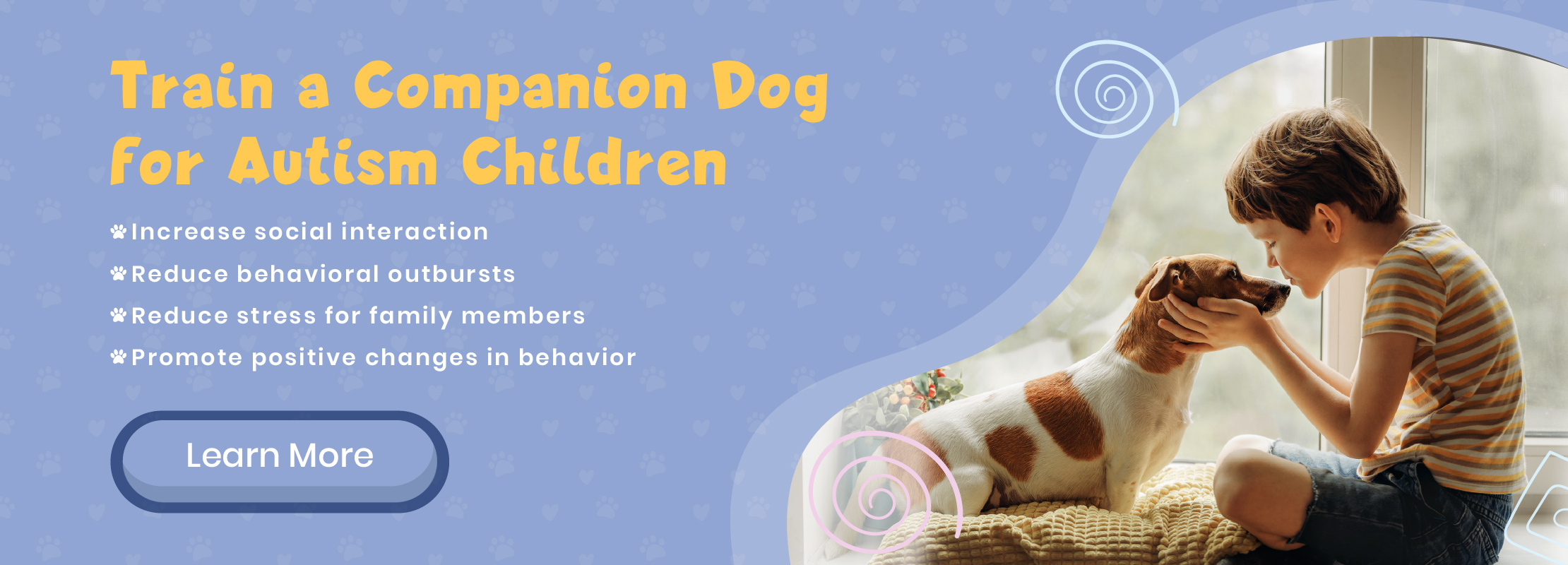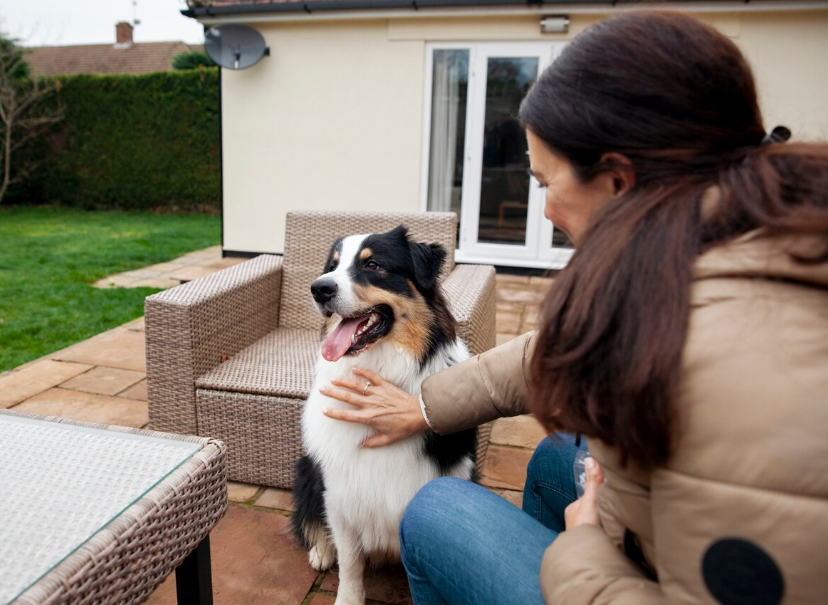- What You Should Know About Autism?
- What Are Autism Assistance Dogs for Children?
- Service Dogs, Therapy Dogs, or Companion Dogs- Is there a Difference?
- Which Skills and Areas of a Child’s Life Can Be Improved By Using an Autism Service Dog?
- What Should Every Parent Consider Before Getting An Autism Service Dog?
- Best Breeds For Autism Service Dogs
- How Much Does an Autism Service Dog Cost?

In most of our articles, we have described the various tasks that service animals can perform to assist people with disabilities. Life with a disability can be incredibly challenging, which is why service dogs are such a vital part of their handler’s lives. While adults with disabilities typically have life experience and are prepared to handle various daily challenges, children with disabilities, on the other hand, face even more difficulties due to a lack of experience and a limited understanding of the world.
What You Should Know About Autism?
Autism Spectrum Disorder (ASD) is a developmental disability that affects many people worldwide, especially children. It is characterized by conditions such as autistic disorder, pervasive developmental disorder not otherwise specified (PDD-NOS), and Asperger syndrome. These conditions generally involve impairments in speech, social skills, nonverbal communication, as well as repetitive and restricted behaviors.
According to the Centers for Disease Control and Prevention, "about 1 in 31 (3.2%) children aged 8 years has been identified with ASD".
Some social impairments may include:
- Not responding to one’s name by the age of 9 months
- Not showing facial expressions
- Not making or avoiding eye contact
- Lack of variety in gestures, or using no gestures at all by 12 months
- Rejecting physical contact
Communication impairments may include:
- Delayed speech
- Repeating certain phrases or words
- Difficulty staying on topic during conversations
- Robotic-sounding speech
Repetitive behavior types may include:
- Hyperactivity
- Fixation on particular objects
- Sensitivity to sound and light
- Constant twirling, jumping, or hand-flapping
Other symptoms:
- Delayed cognitive skills
- Epilepsy or seizure disorders
- Excessive anxiety, stress, or fear, or conversely, a lack of fear altogether
-
As life can be particularly challenging for children diagnosed with ASD, many parents turn to service animals to help provide their children with proper assistance.
What Are Autism Assistance Dogs for Children?
Autism service dogs for children are specially trained to help them gain independence and perform daily activities.
A service dog is not a pet but rather medical equipment, and their work is directly related to the symptoms of autism or other developmental disorders the child may have.
Service Dogs, Therapy Dogs, or Companion Dogs- Is there a Difference?
When choosing an assistance dog for their child with autism, parents need to be familiar with the different types of animals that can provide support.
Service Dogs are subject to the ADA regulations and must not be denied public accommodation rights. A service dog is allowed to accompany the child everywhere, including at school, during medical treatments, while traveling, or when shopping. Service dogs can be trained to interrupt harmful behaviors, such as anxiety or hyperactivity, and help calm the child.
Therapy Dogs are trained to provide the individual with emotional support and comfort. They are usually used in different facilities like hospitals, nursing homes, schools, libraries. These dogs are well-behaved and have gained popularity among parents with autistic children due to the calming effect they have on the children. Although these canines can be used as support animals for children with ASD and accompany them in the facilities mentioned above, they do not have a status of service dogs.
Therapy dogs are not granted public accommodation access rights.
Similar to Therapy Dogs, Emotional Support Animals (ESAs) provide comfort and companionship, but they are not trained to perform specific tasks related to a health condition. Unlike Therapy Dogs, however, ESAs provide support to just one individual.
A Companion Dog can be any family dog that offers daily emotional support to a child diagnosed with autism. The daily care and regular walks that a dog requires are beneficial for the child, helping them develop practical and social skills. However, a companion dog is not a service dog, as it is not trained to perform specific tasks.
Which Skills and Areas of a Child’s Life Can Be Improved By Using an Autism Service Dog?
Socialization Skills
Eye contact is an important part of non-verbal communication and the presence of а service dog can notably improve it. As service dogs are trained to make eye contact with the individual they support and to be able to focus on them, a child with autism can get used to the eye contact. When the child starts feeling comfortable with the dog’s eye contact, this feeling may be redirected to people as well.
The presence of a service dog can help a child participate in a conversation easily. Questions related to the dog’s name, breed and age may be asked by people. As a child is likely to remember the answers to frequently asked questions, it can be able to take part in the conversation. The self-confidence of the child and its conversation skills will improve. Moreover, the regular use of command words, when asking the dog to perform a task, will improve their speech.
The presence of a service dog can be very helpful for a child with autism since it can learn to be more emphatic, socially adequate, and recognize non-verbal signs like body language and facial expression.
Emotional state and behavioral issues
As children with autism may be over-sensitive to different stimuli and experience emotionally unstable episodes, a service dog can help them overcome these episodes and remain calm. A service dog can be trained to provide tactile stimulation (especially a Psychiatric Service Dog) by gently nudging, hugging the child, jumping on their lap (for small breeds), or placing their chin on the child's lap.
Children tend to be afraid of visiting medical facilities. A service dog can relieve the feeling of fear and anxiety, by accompanying the child to different facilities or public spaces. Participating in the training of a service dog can be seen as an opportunity for the children with autism to deal more easily with the variety of activities, places, and people they meet on a daily basis.
Life experience
The daily interaction with a service dog like exercising, training, grooming, petting can teach a child with autism different activities, improve its cognitive skills and create a daily routine. Being involved in the dog’s raising can lead to the child’s desire to take care of other people and itself.
Prevent the child from eloping
Some children with autism attempt to run away from their homes, which is a serious problem for their parents. Children with autism are often physically hard to control. When a service dog is attached to the child, it is less likely to be able to run away. In addition, a service dog can be trained to interfere with certain movements of the child.
Alerting the parents
A service dog can be trained to recognize potentially dangerous activities in that the child may want to be engaged and to alert its parents.
What Should Every Parent Consider Before Getting An Autism Service Dog?
Before getting a service dog for your child, you need to ensure that the child is not afraid of dogs and can get along with them. It is not necessary for the child to be an extreme dog lover, but they should be comfortable around dogs and not fear them. The child should also not be allergic to dog fur.
Since service dogs are trained to perform tasks, some of which can be quite demanding, they require playtime and relaxation to recover. Parents of children with autism must be patient, motivated, and dedicated to the training and care of the dog. If the child's behavior changes over time, the tasks that the service dog performs should be adjusted accordingly. This process should be consistently supervised.
Best Breeds For Autism Service Dogs
When looking for an autism service dog breed, you need to consider which features the breed should possess. Best breeds as service dogs for children with autism need to be calm, with a stable temperament, patient, to be easy-going, to be appropriate as family dogs, to be intelligent, and able to perform different tasks. As we explained in the beginning of the article the ASD is related to a range of disorders and every child may have different needs.
Some of the most suitable breeds as autism service dogs are considered: Golden Retriever, St. Bernard, Labrador Retriever, Poodle (or a mix of two breeds- Labradoodle), German Shepherd, Collie, Samoyed, Bernese Mountain Dog, Yorkshire Terrier, Pug, Beagle.
How Much Does an Autism Service Dog Cost?
According to the National Service Animal Registry, the average cost of a service dog is $15,000-$30,000 approximately. Fortunately, there are courses and guides that help people with different types of disabilities to train their service dog.













